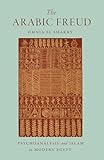The Arabic Freud : Psychoanalysis and Islam in Modern Egypt / Omnia El Shakry.
Material type: TextPublisher: Princeton, NJ : Princeton University Press, [2017]Copyright date: ©2017Description: 1 online resource (224 p.)Content type:
TextPublisher: Princeton, NJ : Princeton University Press, [2017]Copyright date: ©2017Description: 1 online resource (224 p.)Content type: - 9780691174792
- 9781400888030
- Islam and psychoanalysis
- Psychoanalysis and religion
- Psychoanalysis -- Egypt -- History -- 20th century
- Psychotherapy -- Religious aspects -- Islam
- HISTORY / Middle East / Egypt (see also Ancient / Egypt)
- Abu al-Wafa al-Ghunaymi al-Taftazani
- Arabic
- Egypt
- Egyptian legal system
- Islam
- Islamic discourses
- Islamic philosophy
- Islamic tradition
- Julia Kristeva
- Majallat ʿIlm al-Nafs
- Muhammad Fathi
- Muhammad Mustafa Hilmi
- Sigmund Freud
- Sufism
- Yusuf Murad
- classical Islam
- crime
- criminal
- desire
- divine discourse
- divine transcendence
- ethical encounters
- ethical engagement
- ethics
- forensic practices
- gender
- human difference
- law
- legal regimes
- modern selfhood
- mysticism
- postwar Egypt
- postwar psychoanalysis
- psychoanalysis
- psychoanalytic psychology
- psychosexual subject
- secularization
- sexuality
- social scientific thought
- socius
- unconscious
- 297.2/61 23
- online - DeGruyter
- Issued also in print.
| Item type | Current library | Call number | URL | Status | Notes | Barcode | |
|---|---|---|---|---|---|---|---|
 eBook
eBook
|
Biblioteca "Angelicum" Pont. Univ. S.Tommaso d'Aquino Nuvola online | online - DeGruyter (Browse shelf(Opens below)) | Online access | Not for loan (Accesso limitato) | Accesso per gli utenti autorizzati / Access for authorized users | (dgr)9781400888030 |
Browsing Biblioteca "Angelicum" Pont. Univ. S.Tommaso d'Aquino shelves, Shelving location: Nuvola online Close shelf browser (Hides shelf browser)
Frontmatter -- Contents -- Acknowledgments -- Note on Transliteration and Translation -- Introduction. Psychoanalysis and Islam -- PART I. THE UNCONSCIOUS AND THE MODERN SUBJECT -- 1. Psychoanalysis and the Psyche -- 2. The Self and the Soul -- PART II. SPACES OF INTERIORITY -- 3. The Psychosexual Subject -- 4. Psychoanalysis before the Law -- Epilogue -- Notes -- Glossary -- References -- Index
restricted access online access with authorization star
http://purl.org/coar/access_right/c_16ec
The first in-depth look at how postwar thinkers in Egypt mapped the intersections between Islamic discourses and psychoanalytic thoughtIn 1945, psychologist Yusuf Murad introduced an Arabic term borrowed from the medieval Sufi philosopher and mystic Ibn 'Arabi-al-la-shu'ur-as a translation for Sigmund Freud's concept of the unconscious. By the late 1950s, Freud's Interpretation of Dreams had been translated into Arabic for an eager Egyptian public. In The Arabic Freud, Omnia El Shakry challenges the notion of a strict divide between psychoanalysis and Islam by tracing how postwar thinkers in Egypt blended psychoanalytic theories with concepts from classical Islamic thought in a creative encounter of ethical engagement.Drawing on scholarly writings as well as popular literature on self-healing, El Shakry provides the first in-depth examination of psychoanalysis in Egypt and reveals how a new science of psychology-or "science of the soul," as it came to be called-was inextricably linked to Islam and mysticism. She explores how Freudian ideas of the unconscious were crucial to the formation of modern discourses of subjectivity in areas as diverse as psychology, Islamic philosophy, and the law. Founding figures of Egyptian psychoanalysis, she shows, debated the temporality of the psyche, mystical states, the sexual drive, and the Oedipus complex, while offering startling insights into the nature of psychic life, ethics, and eros.This provocative and insightful book invites us to rethink the relationship between psychoanalysis and religion in the modern era. Mapping the points of intersection between Islamic discourses and psychoanalytic thought, it illustrates how the Arabic Freud, like psychoanalysis itself, was elaborated across the space of human difference.
Issued also in print.
Mode of access: Internet via World Wide Web.
In English.
Description based on online resource; title from PDF title page (publisher's Web site, viewed 29. Jul 2021)









